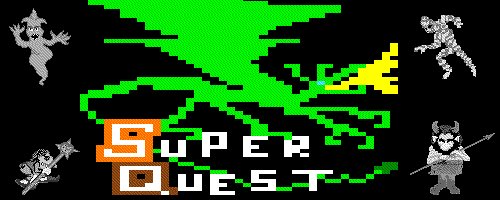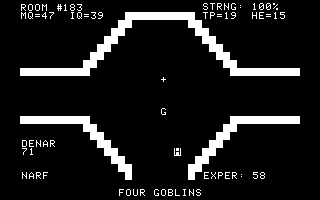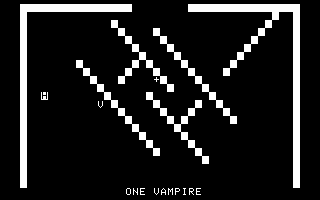

Quest
For eons the forces of technology threatened
to obliterate even the memory of something
called "magic"; yet, by the twenty-third century, an astonishing reversal
is evident. Many
machines function sporactically-- even 'ancient' personal computers
must employ complex
'boot-up spells' and rely upon moonbeam power! In "Super Quest", your
objective is to
penetrate the maze of Saladin and activate the fabulous Mega Crown,
the one device that
might restore the balance of technology and magic.
The Maze
The maze has more than one-thousand chambers
and corridors arranged in four large
sections or "levels". Throughout the labyrinth are treasure chests
containing gold, jewels,
and other valuable items as well as weapons, vials of healing
elixir, and a magic lamp.
Some chests, however, are full of junk or even empty. Monsters guard
the treasures to
guarantee that only a hero of tested mettle reaches the Mega Crown.
There is only one known entrance, through an
underground passage to the middle of
the first level. The Mega Crown is said to reside somewhere in the
fourth level. Just
outside the maze is a bazaar and inside it are two hospices (the latter
are maintained by
maze gnomes). These are places where you may rest (do a game-save),
sell treasures,
and bargain with greedy merchants for weapons and other supplies.
Human, Hobbit, Elf, or Dwarf?
Upon booting you are first given an opportunity
to review an introductory narrative
and game directions. Next, you may return to the quest with a previously
saved character
or create a new one. There is ample space on the game diskette to maintain
fifty or so
active characters.
When creating a hero, you name the character,
enter your initials, and select his/her
race. Briefly, Humans are best in close combat; Hobbits are best in
the use of magic;
Elves are the best archers; and Dwarves are physically the toughest.
A detailed
breakdown of attributes is available in the game; so you can pick the
race best-suited
to your skills and style of play.
Weapons, Armor, and Potions
Each hero is initially furnished with light
armor, a longknife (for "hand combat"), a
crossbow with a supply of iron quarrels and magic quarrels, a few vials
of Tana Powder,
and some healing elixir. Race and "strength" determine the number of
quarrels which
may be carried into the maze. No such limits exist for Tana Powder
or healing elixir.
Once in the maze, you will discover that you can carry anything you
find.
A weapon's accuracy and hit power depend on
the weapon, distance, the attributes
of the hero who wields it, and the monster against which it is directed.
The longknife
("hand combat") is effective only against monsters in an adjacent space;
quarrels and
Tana Powder can work at long distances. Magic quarrels are inherently
more accurate
and inflict greater damage than iron quarrels. Tana Powder has the
hit power of a magic
quarrel but is effective only against demons and "undead" monsters.
(It is the only
weapon effective against the dread Afreet.)
The light armor supplied each beginning character
is better than no armor at all, but
provides minimal protection against dragon fire. Dragon Fire Armor
(fashioned from
dragon ears) is much more effective. As soon as you acquire sixty dragon
ears and enter
the bazaar or a hospice, a coat of Dragon Fire Armor will be crafted
for you. This is a
free service of the empire.
Healing elixir restores strength. One vial
brings your strength to 100% of current
potential. Strength Potion, on the other hand, increases the absolute
level of your strength;
though expensive, it is an excellent investment. Strength Potion is
rarely, if ever, found in
treasure chests. You can purchase it at the bazaar or a hospice.
Experience and Strength
As you obtain treasure and vanquish monsters
you acquire experience. The more
valuable the treasure or the tougher the monster, the greater the experience
gained.
Experience increases the accuracy and hit power of a character's attack.
It compensates
for initial deficits and accentuates positive attributes. Thus, an
experienced Hobbit may
be a better archer than a beginning Elf.
Strength is the other major factor in accuracy
and hit power; it also impacts attack
resistance or "toughness". An Elf who has acquired extra strength might
be able to absorb
more punishment than a normal strength Dwarf. Both experience and strength
are
unqualified positive attributes. Stronger, more experienced heroes
do not attract more
numerous, more deadly monsters.
Gold
Except for weapons, elixirs, and the Magic
Lamp, treasure obtained from the maze is
valued in Gold Denars. The only way to obtain the gold needed to buy
supplies and
potions is to go into the maze and take it.
Your magical backpack can hold enormous quantities
of treasure and render it nearly
weightless; but, it can not disguise the scent of gold, gems, and other
valuables from the
monsters which rove the maze. The more treasure you carry, the
greater the probability
of meeting roving monsters, and the more deadly these are likely
to be.
The Magic Lamp
Normally, to get from one point to another
in the maze, you must fight your way
through a host of hostile monsters. The Magic Lamp provides the single
alternative. One
rub and you are transported elsewhere immediately. Regrettably, you
don't know where
"elsewhere" may be, except that it is somewhere in the labyrinth. The
Magic Lamp is
placed at random; and so may be discovered in almost any room in a
treasure chest.
Once used, it vanishes (back into another treasure chest). You cannot
remove the Lamp
from the maze; if you enter a hospice or the bazaar, it leaves your
possession.
Monsters
Thirteen kinds of monster inhabit the maze.
Some (imps, skeletons, vampires, zombies,
mummies, and afreets) may be attacked using Tana Powder (wraiths are
only slightly
susceptible). Other monsters must be killed with quarrels or in close
combat. Table 1 lists
monsters showing relative strength and weapons effectiveness for each.
Table 1: Weapons Effectiveness
*Note: NV = generally "Not Very" effective
Known
Relative Hand Iron Magic Tana
Monster Strength
Combat Quarl Quarl Powder
Imp
12 Yes No
No Yes
Skeleton
25 Yes Yes
Yes Yes
Goblin
38 Yes Yes
Yes No
Zombie
55 Yes Yes
Yes Yes
Vampire
77 Yes Yes
Yes Yes
Giant Spider 85
NV* Yes Yes No
Mummy
97 Yes Yes
Yes Yes
Troll
106 Yes Yes
Yes No
Ogre
121 NV* Yes
Yes No
Wraith
181 No No
Yes NV*
Afreet
250 No No
No Yes
Dragon
500 NV* NV*
Yes No
Rogue Dragon 1000
NV* NV* Yes No
While the "relative strength" numbers are a
good indicator of both hit power and
toughness, there are individual attributes and quirks which remain
to be discovered. Spiders,
for instance, move nearly twice as fast as other monsters; trolls are
tougher than they seem;
dragons breathe fire which can inflict great damage at a distance,
etc..
Most treasures are guarded by one or more monsters.
Other monsters rove ravenously
in search of warm-blooded prey. Roving monsters are especially attracted
by the scent of
jewels and precious metal.
Whatever the number of monsters present, you
face just one at a time. Your hero
appears as a flashing "H" with monsters identified by the first letter
of the monster type,
except for giant spiders, whose symbol is "#". The type and number
of monsters is also
shown at the bottom of the screen.
Bow shots and Tana Powder attacks are automatically
directed at the current monster;
you see the quarrel or powder zip towards the monster accompanied by
sound effects.
(Thus, though movement speed is moderately brisk, play emphasizes planning,
strategy, and
other maze adventuring skills.) In case things get desparate,
you can always try running for
an exit; however this allows the current monster in the room exited
to regain its full strength.
Maze Display and Key Functions
As you move through the maze the screen shows an outline of the current
chamber or
corridor (walls and barriers), your hero, any treasure chests ("+")
and monsters, plus vital
status information. The latter includes counts for quarrels, Tana Powder,
and healing elixirs,
along with % strength, experience, value of treasure carried (in Gold
Denars), and current
room number.

Special "large rooms" are an exception, since
they fill most of the screen.

You can still obtain room, status, etc. information,
along with a count of dragon ears and
a summary of key functions by pressing "I" (for "Information").
The only requirement is that
you not be under attack at the time.
The Information display does NOT pause the
game. Should monsters enter the current
room while you are viewing the "I" screen, the display will revert
to the room view and
action continues; so, don't press "I" and go out for a cup of coffee!
In-maze key functions are listed in Table 2.
With a little practice, you will have no trouble
remembering which key does what or which weapon to use against a particular
monster.
To aid beginning questers, the "Information" and "Weapons Effectiveness"
displays are
available for relaxed perusal just after exiting the bazaar or a hospice
and before actually
entering the maze.
Table 2: In-Maze Key Functions
Move up
W
Move left A
D Move right
X
Move down
S or "SPACE" or other non-movement key stops movement
F Fight monster in an adjacent square ("hand combat")
< Fire an iron quarrel (actually "," unshifted)
> Fire a magic quarrel (actually "." unshifted)
P Toss a vial of Tana Powder
H Drink a vial of healing elixir
O Open a treasure chest (hero must be adjacent to a "+")
R Rub the Magic Lamp
I Information/Help display ("RETURN" exits this display)
Traps and Maze Renewal
Traps of various kinds proliferate throughout
the maze. Most of these are simply feints
of the maze itself, though a few are less subtle. In no case, however,
is a trap inherently
escape proof.
Each time you load-in a character and start
play the maze is reinitialized (treasures and
monsters are restored, etc.). To assure that any maps you make will
remain valid from
session to session the maze configuration, with the exception of a
very few "random rooms"
, remains unchanged. "Random rooms" may vary in appearance from one
session to the
next and sometimes open additional exits to provide shortcuts.
Saving Your Character and Exiting the Game
There are two usual ways to end a gaming session.
One is to select the character Save
option offered whenever you are about to enter the maze or have left
the maze and are
about to enter the bazaar or a hospice. Responding "N" (NO) when asked
if you wish to
enter ends play and Saves your character.
The other way to end play is to be killed by
a monster. If your character's "% Strength"
ever reaches zero, he or she is dead, dispatched to heroes' heaven,
and that character's
file is deleted.
If you are in the middle of the maze and must
leave the computer, you can pull your disk
and turn OFF power. Any gains since the last Save will be lost; but,
your character will still
be alive to return again.
The Hall of Heroes
Normally, ending play takes you to the "Hall
of Heroes". This is a scrollable display
listing up to two-hundred heroes, living and dead, ranked in order
of experience points.
Shown here are each heroe's name, race, 'sponsor' initials, and experience,
with the names
of living characters in inverse text. All of this information is maintained
in a 'heroes file'
created the first time you end a gaming session.
A character who reaches the Mega Crown (thus
winning the game) is awarded the rank
of "Prince". Any princes are ranked ahead of other characters in the
"Hall of Heroes",
regardless of experience, in chronological order. That is, the first
character to reach
princehood is ranked first, etc..
Getting Started
Before starting play, it's a good idea to make
a backup of the game diskette. Then, from
time to time, update your backup. This way your characters and the
heroes file will not be
lost in case of a bombed diskette.
To begin, just boot the game disk. If you are
playing on a IIgs, speed and display colors
will automatically be set correctly and restored when play ends. If
playing on some other
Apple II, II clone, or emulator which offers speed acceleration, be
sure to set speed to
"Normal" (1MHz).
Most parts of the game expect letter inputs
to be capitals. If your keyboard can output
lower-case letters, set Caps Lock to ON.
Read through the on-disk "Introduction" at
least one time. It includes a few helpful hints
relating to puzzles.
Once you are in the game explicit prompts get
you quickly into the action. Soon you will
find yourself in the sun-baked bazaar grounds facing a grinning merchant
whose chief
pleasure in life is fleecing greenhorn questers!
Rubywand
Downloads
Game
.
Super Quest (.sdk ShrinkIt disk archive) from.Ground
Super Quest (.dsk emulator disk image) from.Ground
Super Quest (.sdk ShrinkIt and .dsk emulator disk image in .zip)
from.GSWV
Copy of Directions
.
Apple II Text files 40 & 80 col format and IIgs Teach file (.shk
files in .zip) from GSWV